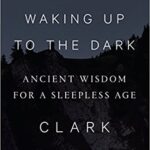Waking Up to the Dark
Ancient wisdom for a sleepless age
By Clark Strand | Illustrated by Will Lytle | Penguin Random House (April 28, 2015)
Do you often find yourself awake in the middle of the night? If you do, what do you do? Do you toss and turn and try to force yourself back to sleep? Do you start to take medications that help you sleep through the night? Or do you just lay back and relax in a semiconscious state?
In his 2015 book, Waking Up to the Dark: Ancient wisdom for a sleepless age, Clark Strand advises us to just relax in a semiconscious state. Strand found that waking up in the middle of the night is natural for humans; a common experience that our ancestors shared for thousands of years.
The lightbulb
He contends that the proliferation of artificial lighting brought a “rigorous controlled way of living” to the modern world. This new way of living, or should I say sleeping, disrupted our nightly spiritual state of being awake with our minds at rest.
The darkness of night
The book is a personal story of Strand investigating the relationship between the darkness of night and our soul’s journey. I really enjoyed it.
His interest began at the age of 9 when he would slip out at night and walk the neighborhoods and wooded areas near his home. It is there that he experienced the darkness of nighttime in a world without electricity.
59 Pocket Notebooks
As he grew older, he knew there had to be a rhythm to life that followed the rising and the setting of the sun — especially during paleolithic times. He began writing down his thoughts and by the time this book was written, he had 59 pocket notebooks filled with his own experiences, and the research he discovered about primitive sleep habits.
Some of the research he found shows how the darkness of the night explains our current problems with insomnia.
He argues that insomnia is not a time for concern, but rather a time for contemplation and connection to the ancient ancestral wisdom.
The dark of night is when our minds can best be inspired and open for renewal.
This is a new way of thinking for me.
The research he found, illustrates that when there was no artificial light, people
-
-
- slept for four-hours,
- woke for two-hours, and
- slept again for four-hours.
-
This sleep pattern has been found in modern day sleep studies on subjects living with natural light only.
I recommend this book
With our souls trapped in a world of constant light and very little natural darkness, Waking Up to the Dark can help us learn to accept the power of natural darkness.
This book is for all of us who have awakened in the middle of the night and couldn’t get back to sleep. Now we know it’s natural, and now we know what to do. Relax.
Enjoy the read.
~~Ellen
P.S. You can find a lot of information about Clark Strand’s books and his research online. I found an interesting two-part literary interview at Read, Learn, Live Podcast you might want to check out for yourself.
